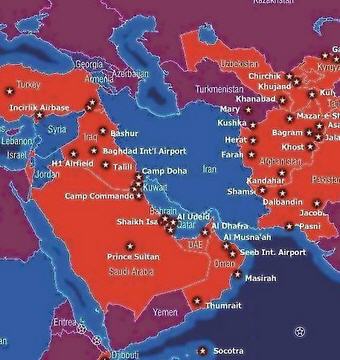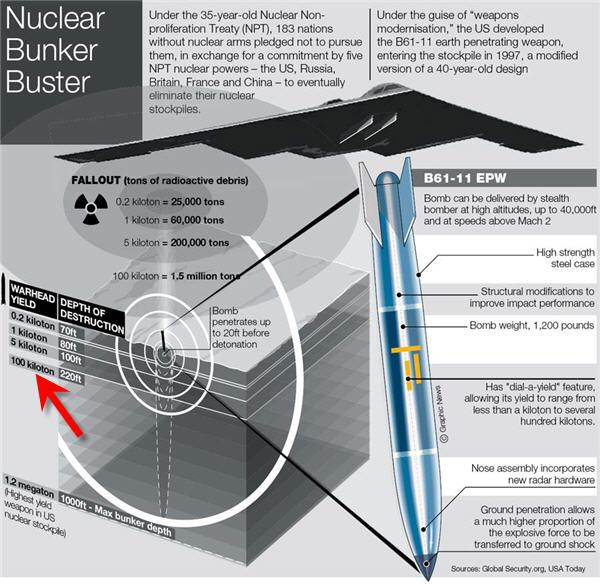They’re Beating the Drums of War to Attack Iran
But there’s an alternative no one seems to have thought of Feb 25 2012Update: Mar 1: The Israeli Prime Minister heads to Washington to interfere with American foreign policy by drumming up support from Congress and addressing AIPAC to demand American military action against Iran, with the Republican presidential hopefuls following close on his heels a day later at the pro-Israel lobby, all of them baying that Obama let loose the dogs of war.The Israeli military is coming to the belated conclusion that it doesn't have the power to deal a decisive blow against Iran's widely scattered nuclear facilities. It has no aircraft carriers and 100 planes would be needed, according to a Pentagon estimate, flying 1,000 miles to the targets and needing to refuel in the air from a limited arsenal of transports. "I think a modern air force like the U.S. air force can deal with it easily", said a former senior Israeli security official with a smile, quoted in Time magazine. 
U.S. military bases surrounding Iran.
The United States gives Israel $3 billion a year in military assistance, but now Israel is saying, let Americans risk their lives and declare war on Iran while Israel observes from the sidelines.
The latest development was preceded by weeks of everyone’s saying “nothing’s off the table”. Defense Secretary Leon Panetta has said, “the United States will not tolerate the blocking of the Strait of Hormuz", which Iran threatens to do if President Obama applies further U.S. sanctions; "That’s another red line”. Israel’s Defense Minister, Ehud Barak, says “time is running out”. In a Senate Intelligence Committee meeting, California Senator Diane Feinstein let slip that she met with the head of Mossad, Israel’s intelligence agency. So had CIA Director David Petraeus. At that same hearing, U.S. Director of National Intelligence James Clapper told us, “Iranian officials... are now more willing to conduct an attack in the United States". And the Wall Street Journal reported that Iran is assisting al Qaeda operatives.
Those last items, that the Iranians are linked to al Qaeda and are plotting in our midst, triggered alarm bells with several members of the contrarian punditry, who heard such intimations as the sequel to the orchestrated fear mongering that was used to sell Americans on invading Iraq.
In contrast, the Obama administration is firmly against a third war in ten years and strongly urges Israel not to attack, insistent that we first see whether sanctions force Iran’s leaders to climb down from their increasingly isolated position.
The President is hamstrung by a new set of sanctions imposed by the Senate in a nearly unprecedented 100-to-0 vote. They require him by the end of June to penalize any entity — corporations, central banks, etc. — that does business with the Central Bank or Iran, which they must to purchase Iranian oil. And in a still more severe move, the Senate Banking Committee now wants to expel Iranian banks from the Belgium-based SWIFT telecommunications system that handles all interbank transfers, the effect being to bring all Iranian financial activity to a paralyzing standstill.
Threatened by the collapse of their economy, Iran would most certainly act. Its officials have vowed to block the Strait of Hormuz, through which 20% of the world’s oil is transported daily ( see our earlier story). The U.S. will not allow this crippling of the world’s economy, so Panetta assures us that "we would take action and reopen the strait" by the 5th Fleet on station in the Persian Gulf. In other words, if this scenario comes to pass, the Senate will have effectively declared war.
The original bill, crafted by Senators Mark Kirk (R-IL) and Robert Menendez (D-NJ), offered the President no leeway, an example of Congress's wanton disregard for the consequences of its actions as it heedlessly does the bidding of lobbyists and their campaign contributor clients. It is a bill that even penalizes our own allies if they do not obey.
After intense lobbying it was amended to allow the President to not penalize countries that cannot get by without Iranian oil or if our national security is threatened by oil shortages. The administration might also choose to flout the bill on the grounds that it unconstitutionally interferes with the Executive’s right to conduct foreign policy.
But the sanction clock winds down to zero at the height of election season. If Mr. Obama loosens the chokehold on Iran by use of the waivers added to the bill, his opponent will relish portraying him as weak. Incredibly, presidential politics could push us into another war.
The wild card is IsraelLeon Panetta thinks Israel is likely to attack in April or May. They are already factoring in the likely casualty count wrought by rockets lobbed over their northern border by Iranian proxy Hezbollah in Lebanon. Panetta’s Israeli counterpart, Ehud Barak, worries that there is a “zone of immunity” that Iran will enter after six to nine months when they will have enough enriched uranium for a bomb. Israel fears that, given Obama’s disinclination to rush to war, if the sanctions do not work, the United States may not attack even then, and Israel will have missed its narrowing window of opportunity at least to delay Iranian progress.
That other alternative we mentioned?That Iran has conducted its nuclear development in tunnels dug deeply into mountains is taken as strong indication that it is enriching uranium for other than benign purposes. What is known from the International Atomic Energy Agency is that in a virtually impregnable mountain bunker near Qom, they are enriching uranium to a level that could be turned into fissile material for a warhead — in other words, poised to build a bomb quickly if they decide to. But the fact is, we do not yet know if Iran has decided to build a bomb and a premature attack short of their taking that final step would be the Iraq “weapons of mass destruction” blunder all over again.

Only a nuclear bunker buster of 100 kilotons could reach the 220 foot depth of the tunnels at Qom
(see red arrow at lower left). Use of nuclear would have disastrous consequences, releasing massive
amounts of radioactive fallout as this video from the Union of Concerned Scientists shows.
Iran has been clever to conduct all work deep underground. Are we being intelligent to think only of blasting away at mountains with bunker busters in what seems most likely to be a vain attempt to end their program?
To use a weapon, Iran needs to bring it out in the open. To pose the threat that is the principal fear of Iran’s gaining nuclear warhead capability, they then have to mount it on a rocket, and that would be a Shahab-3, capable of reaching Israel. With satellites and stealth aircraft reconnaissance and possibly even drones, that setup activity can be monitored. Tracking Saddam Hussein’s Scuds on mobile platforms proved difficult in 1991, but surveillance technology has vastly improved over twenty years. Once either convinced that Iran has a weapon or persuaded by their continued non-compliance over a long enough interval for them to have developed one, the West would impose what is analogous to a no-fly zone — warning that any rocket transports or launchers will be destroyed. There are hazards to this strategy. Iran might choose the moment of setting up a rocket launch for simultaneously attacking our naval forces in the hope of disrupting our counterstrike. But the question is: why is there no hint that this strategy is even being considered?
With satellites and stealth aircraft reconnaissance and possibly even drones, that setup activity can be monitored. Tracking Saddam Hussein’s Scuds on mobile platforms proved difficult in 1991, but surveillance technology has vastly improved over twenty years. Once either convinced that Iran has a weapon or persuaded by their continued non-compliance over a long enough interval for them to have developed one, the West would impose what is analogous to a no-fly zone — warning that any rocket transports or launchers will be destroyed. There are hazards to this strategy. Iran might choose the moment of setting up a rocket launch for simultaneously attacking our naval forces in the hope of disrupting our counterstrike. But the question is: why is there no hint that this strategy is even being considered?
Please subscribe if you haven't, or post a comment below about this article, or
click here to go to our front page.


The sentence above gives me pause: “But the fact is, we do not yet know if Iran has decided to build a bomb and a premature attack short of their taking that final step would be the Iraq “weapons of mass destruction” blunder all over again.” How do you know they have “….tak(en) that final step…”? The intensions have been made clear, the Iran STATED policy is to wipe Isreal of the map. The “…final step…” you you point out, may be to test whether their efforts have born fruit on a civilian target in Isreal. Are you willing to take that gamble?
The premise that they would have to put it on a rocket, and therefore we’d see it before it was launched is pure folly. Transport of a redimentary nuclear device is easy, launching one on a rocket is hard. The preferred delivery would be a single truck disguised as transporting something else. If transport was easy to cut off, Hezbollah would have no weapons.
If you say that sanctions will collapse the Iranian economy, and that is tenamount to an act of war, then your priorities are profoundly biased. You seem to sanction Iran’s threat to close the Straights of Hormuz for this reason, but you deny Isreal’s right to lobby for action when the threat has been made directly at them?